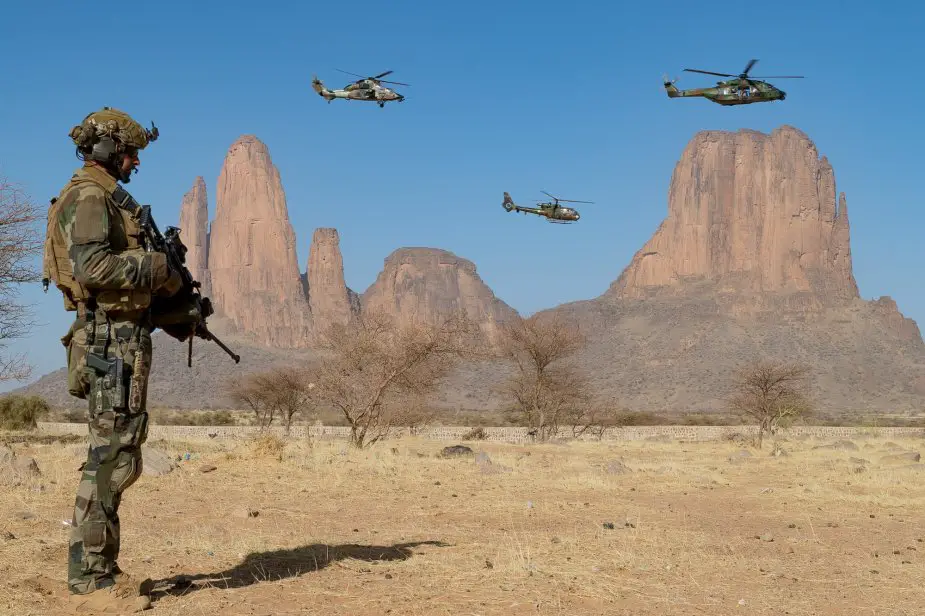Breaking news
Operation Barkhane: assessment of operations 2019 against Islamist terrorists.
In 2019, Operation Barkhane continued its direct action against armed terrorist groups, in particular in the Liptako Gourma region, with more than 100 operations conducted by the French army alone or jointly with partner forces. Two important figures of the RVIM (Rally for the Victory of Islam and Muslims), close to Iyad ag Ghali, were also neutralised: Djamel Okacha, alias Yahia Abou el Hamman, and Ali Maychou, alias Abderahmane al-Maghrebi.

In 2019, Operation Barkhane continued its direct action against armed terrorist groups, in particular in the Liptako Gourma region, with more than 100 operations conducted by the French army alone or jointly with partner forces (Picture source: French Army )
In addition to the disabling of many members of armed terrorist groups, Operation Barkhane also seized or destroyed several hundred motorcycles and pick-ups and a very large quantity of ammunition of all calibres, as well as electronic equipment.
These direct operations against terrorist armed groups (TAGs) are essential in order to reduce their capacity to cause harm and bring them within the reach of local armies. They deal a severe blow to these organisations and help secure the Sahel. However, as the Chief of Staff of the Armed Forces (CEMA) recalled this summer, "The indicator of success is not the number of jihadists killed but the quantity of the population that is not, or no longer, under the control of these groups". In fact, the attrition of TAGs is also played out beyond physical elimination or capture: the global approach, of which Barkhane is the military component and on which France's strategy in the Sahel is based, contributes to the drying up of the recruitment channels for TAGs by creating the conditions for the return of the state and development.
In order to carry out these large-scale operations, the support of the partners of the national armies and the joint G5 Sahel force has been fundamental. The year 2019 will thus have seen a strengthening of cooperation between the soldiers of Barkhane and foreign partner forces through a genuine combat partnership. The systematic integration of partner forces into operations has thus represented up to more than 50% of the volume of troops engaged. The FCG5S also conducted about ten operations, acting in areas of operations complementary to those of Barkhane. This inclusion of G5 Sahel forces in the operations is the culmination of the Barkhane operational military partnership, which has made it possible to train more than 4,000 soldiers of the partner forces, more than half of whom are Malians, through more than 600 training activities.
The support of the air component from Niamey or Ndjamena was decisive for these operations, with 950 sorties that made it possible to fight directly against the TAGs, to support the ground component and partners on the ground, defending as necessary or reassuring allied forces' right-of-ways.
2019 will also have been the theatre of increased engagement by our European partners, in particular through the arrival of two Danish Merlin helicopters. Our European partners are essential for transport and medical evacuation missions, as illustrated by the action of the British detachment, which enabled the transport of more than 8,000 soldiers with its 3 CH-47 Chinook helicopters in 2019. Estonia, for its part, has announced the reinforcement of its detachment by 2020, which currently numbers some 50 soldiers based in Gao. In addition to this support, Spain, Germany, the United States and Canada continue to provide valuable assistance to Operation Barkhane in the field of air transport of personnel and equipment. Belgium, with 85 troops, armored vehicles and NH-90 helicopters, is carrying out numerous missions within the framework of the MINUSMA.
With more than 30 logistic convoys to supply food, equipment and fuel to the various sites in Mali, the Desert Logistics Battle Group (DFLBG) has once again been a central element of the Barkhane force's action. In support of all operations, it provided all the logistical means necessary for the success of the missions. Together with its maintenance elements, it contributed to the maintenance and repair of the entire fleet of more than 800 vehicles (heavy and light armoured vehicles, logistics vehicles, etc.) of Operation Barkhane, which were subjected to severe strain in a particularly harsh environment.
In parallel and in addition to these operations, the Barkhane force, together with its partners, carried out direct support missions for the benefit of the population. 76 civil-military action projects were thus carried out in the Sahel-Saharan strip. For example, the 35 actions undertaken in the Liptako-Gourma resulted in the implementation of 6 water supply projects, 13 agropastoralism projects and 16 projects in education, energy and access to information. With regard to medical assistance to the population, the health service of Operation Barkhane carried out more than 100 daily consultations (medicine, surgery, traumatology, dentistry, etc.) and about 400 treatments per day.
Finally, 2019 will have been sadly marked by the deaths in operation of 17 French soldiers who died for France, as well as soldiers from Burkina Faso, Mali, Niger and Chad who died in combat in the fight against terrorism and in defense of their countries.
Operation Barkhane, led by the French armies, in partnership with the G5 Sahel countries, was launched on 1 August 2014. It is based on a strategic approach based on a logic of partnership with the main countries of the Sahel-Saharan strip (BSS): Burkina-Faso, Chad, Mali, Mauritania and Niger. It brings together some 4,500 military personnel whose mission is to combat armed terrorist groups and support the armed forces of partner countries so that they can take this threat into account.


























